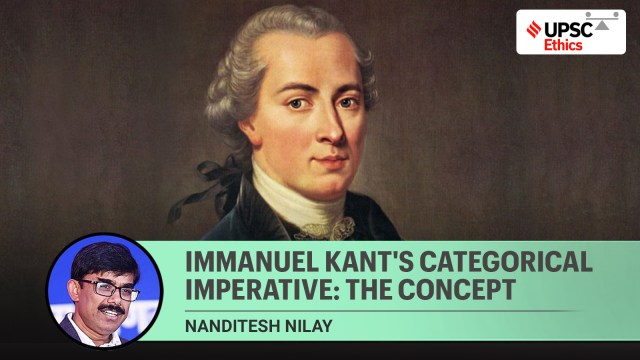UPSC Ethics Simplified | Immanuel Kant’s Categorical Imperative: the concept
The whole debate of working hours takes us nearer to Kant’s idea of moral rights and to ponder whether man is an end or means. Let's explore his philosophy with real-world examples and a post-read question for UPSC Mains.
 Whenever we seek an answer to this question, we are bound to look towards none other than one of the greatest modern philosophers, Immanuel Kant (1724-1804).
Whenever we seek an answer to this question, we are bound to look towards none other than one of the greatest modern philosophers, Immanuel Kant (1724-1804).Relevance: The topic is a part of UPSC CSE General Studies Paper-IV Ethics syllabus. Concepts are particularly relevant in the theory section. Aspirants will also find the article useful for their Essay paper and situation-based questions in personality tests. Moreover, the article’s essence will help aspirants professionally and in life.
Nanditesh Nilay writes for UPSC Ethics Simplified fortnightly. The first article will be a concept while the second article will be a caselet, based on the concept. Don’t miss the ‘Post Read Question’ below.
What is the basis for moral rights? Whenever we seek an answer to this question, we are bound to look towards none other than one of the greatest modern philosophers, Immanuel Kant (1724-1804). To say a person has a moral right means they are entitled to have it regardless of the utilitarian benefits. Kant believed that there are certain moral rights and duties that all human beings possess. But before we talk about philosophy, it is interesting and important to know more about the philosopher who led an academic but uneventful life.
Kant was a man of time and people loved to adjust their watches by him. He was a man who was ready to remain uneventful but academic. However, one day he was so impressed by the style of a book that he preferred to ignore the matter itself. The book was Emile by Rousseau. Later he revisited the book to realise something important. We shall get back to it in the later part of our discussion. What is important to note here about Kant is that he was influenced by Rousseau as well as the French Revolution and his doctrine of the Rights of Man was simple: “There can be nothing more dreadful than the actions of a man should be subject to the will of another.” His reason brought the identity of a man at the center and so the moral act.
Later he came up with fundamental principles that completely changed the world of utilitarianism. He searched for a mechanism to know about people’s moral rights and the idea or basis of moral rights. Kant claimed that every man must be regarded as an end in himself. (Just to remind you, Mahatma Gandhi emphasised on ‘means and ends’.) For Kant man was never any ‘mean’. The morality of an act is the centre of Kant’s philosophy. Treating human beings as mean was unacceptable to Kant. It was like arresting the spirit of humanity.
We can relate Kant’s philosophy to an unfortunate incident that you must have seen in the news. Anna Sebastian Perayil, 26, working with multinational consulting firm Ernst & Young (EY) as a chartered accountant, died on July 20. Her mother Anita Augustine’s open letter to the company alleging that Anna succumbed to “work pressure”. There are also examples of people leaving their bosses rather than the organisations as they feel they are not being treated well. The whole debate of working hours itself takes us nearer to Kant’s moral rights and assertion that man is an end rather than means.
His most important book is The Critique of Pure Reason and it took almost twelve years to find answers to his questions. However, he took only a few months to shape his ideas into theories. He believed that there is not a single metaphysical problem which has not been solved, or for the solution of which the key at least has not been supplied. That principle or the key Kant proposed is Categorical Imperative which is in the form of an ethical system and appeared in his Metaphysics of Morals(1785). Kant in this book mentions that the moral worth of an act only exists when a man acts from a sense of duty rather than accepting the duty of an act which is prescribed. Now here the essence of moral act can be understood by the spirit of law itself. In nature or our life we as human beings love to do everything as per the law or according to law.
Returning to an earlier point that is worth revisiting — Kant disrupted his timetable to read the book Emile several times only because he believed that he missed something in the first reading. So it was not the result of the act but the moral intent of the act that Kant understood and established. He argues that only a rational being can act or possess the power to conduct according to the idea of law, i.e. by will. Compelling to the will is the command of the reason and the formula of this command is imperative and that imperative is categorical. So ‘Categorical Imperative’ asserts that without regard to an end, a certain kind of act can be rationally necessary. On the other hand, explaining Hypothetical Imperative Kant says, “You must do so-and-do if you wish to achieve such-and-such an end.”
This reminds us of Tanzanian former Marathon Runner John Stephen Akhwari who fell in the Mexico Olympics but with the bleeding and bandaged knee, he kept on running and finished the race last. There were only a few people left in the stadium by the time he finished the race. Akhwari brought up the reason, that the will of the act, rather than the result, was important. He said, “My country did not send me 5,000 miles to start the race; they sent me 5,000 miles to finish the race.” What a great way to exemplify the ‘Categorical Imperative’ of Kant, isn’t it? Unconditional moral obligation, to put it simply.
When did the world witness this categorical imperative recently? Was it the time of the pandemic? That’s your point to ponder.
Post Read Question for UPSC Mains:
Compare ‘Categorical Imperative’ of Kant with utilitarian principle of ethics by Jeremy Bentham. (Refer previous articles in the Ethics Simplifiedseries.)
(The writer is the author of ‘Being Good and Aaiye, Insaan Banaen’ and ‘Ethikos: Stories Searching Happiness’. He teaches courses on and offers training in ethics, values and behaviour. He has been the expert/consultant to UPSC, SAARC countries, Civil services Academy, National Centre for Good Governance, Central Bureau of Investigation (CBI), Competition Commission of India (CCI), etc. He has PhD in two disciplines and has been a Doctoral Fellow in Gandhian Studies from ICSSR. His second PhD is from IIT Delhi on Ethical Decision Making among Indian Bureaucrats. He writes for the UPSC Ethics Simplified (concepts and caselets) fortnightly.)
The Indian Express UPSC Essentials brings to you the August edition of its monthly magazine. Click Here to read.
Subscribe to our UPSC newsletter and stay updated with the news cues from the past week.
Stay updated with the latest UPSC articles by joining our Telegram channel – Indian Express UPSC Hub, and follow us on Instagram and X.
For your queries and suggestions write at manas.srivastava@indianexpress.com.
UPSC Magazine

Read UPSC Magazine
- 01
- 02
- 03
- 04
- 05































